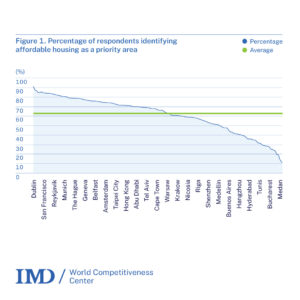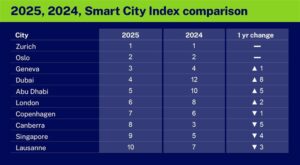
Making housing more affordable is the top priority for most of the respondents of the survey generating the 2025 IMD Smart City Index.
Released today, the Index, now in its sixth year, is the tool that the World Competitiveness Center (WCC) – IMD’s competitiveness powerhouse – uses to assess how cities balance various dimensions. These range from jobs and housing to environmental concerns and inclusiveness.
In 110 global cities out of 146 measured, affordable housing was earmarked as a priority by at least half of the survey respondents.
“Access to housing is a global issue, driven by three major factors: population moves and immigration reducing the supply of affordable housing, overall price increases, and increasing prices of certain commodities,” said WCC Director Arturo Bris.
The 2025 SCI report touches upon how US President Trump’s tariffs on steel (and potentially lumber) are expected to increase development costs, putting further stress on an already-constrained housing supply.
The housing crisis is cutting across geographical divides, rendering it an issue for Dublin and Taipei City, as can be seen in Figure 1, which was taken from the report.

The housing crisis is felt in cities as diverse as Dublin, Vancouver, and Dubai. In these cities, between 80-90% of the 2025 SCI survey respondents expressed concern over the affordability of housing – saying it was a priority area in their city.
“We found that the global phenomenon is just as prevalent in well-developed cities such as Singapore and Lausanne,” said Bris.
Right place, right time – but right size, too
“Ultimately the smartest cities strike a good balance between the constraints and opportunities within their particular urban environment,” said WCC Chief Economist Christos Cabolis.
In the ranking, Zurich was first overall, followed by Oslo, then Geneva.
The Swiss cities of Zurich and Geneva (third) – but also Lausanne, in 10th, together with Norway’s Oslo – all lie outside the EU and yet are well integrated into it via trade and free movement agreements.
“The top three cities are able to provide all the amenities citizens require for a good quality of life while not suffering from diseconomies of scale such as congestion caused by public transport, and pollution,” said William Milner, Associate Director of the WCC.
“They have obtained a somewhat exceptional status thanks to their size, but also their niche economies (oil in the case of Norway, and high quality and high value-added manufacturing exports in the case of Switzerland).”
“Smaller, more independent economies could also prove more protected in the Trump trade war because they have goods that are not highly replaceable in the short term – the knowledge needed would take a generation,” Milner added.
Cities: there’s still no ‘one-size-fits-all’ solution to becoming smart
“When examining the highest-ranked three cities, it is tempting to come up with a formula that small size, plus geographic independence, plus trade resilience equals smart city,” Cabolis says. “However, this oversimplifies a complex picture. Smaller cities often lack the capability to scale.”
“In general, they do not have deep labor markets or large innovation ecosystems. The overarching lesson from Zurich, Oslo, and Geneva is that successful smart cities build on the strong foundations of livability, sustainability, and good governance, using technology strategically to enhance these aspects and empower their citizens, while continuously working to address remaining urban challenges.”
That said, the top 10 cities are united in their provision of high-quality basic services and infrastructure, which form the bedrock of citizen satisfaction.
- Singapore (ninth) scores 83.7/100 for basic sanitation meeting the needs of the poorest areas and 80.2/100 for public safety not being a problem.
- Abu Dhabi (fifth) scores 84.7/100 for medical services provision and 83.8/100 for satisfactory green spaces.
- Dubai (fourth) scores highly on medical services (82.8/100) and green spaces (83.4/100).
- Copenhagen’s (seventh) residents rate recycling services highly (82.2/100) and feel public safety is not a major issue (74.3/100).
- Canberra (eighth) performs well in basic sanitation (78.7/100) and air quality (73.8/100).
- London (sixth) faces some challenges, which are reflected in slightly lower scores in certain areas compared to others in the top 10 (e.g., public safety 37.7/100).

Abu Dhabi and Dubai made the 2025 SCI top 10 for the first time.
“The top 10 demonstrate that smart cities succeed when they prioritize livability, sustainability, and governance, using technology not as a goal but as a tool to empower residents and address local challenges,” Cabolis explains.
New entrants this year were AlUla in Saudi Arabia, Astana (formerly Nur Sultan) in Kazakhstan, Caracas in Venezuela, Kuwait City in Kuwait, Manama in Bahrain, and San Juan in Puerto Rico.
“As we move into a new geopolitical order, cities will play a much more important role than countries,” Bris adds. “We have moved into a fragmented economy and major urban areas will be the center of all economic activities in the coming years.”

